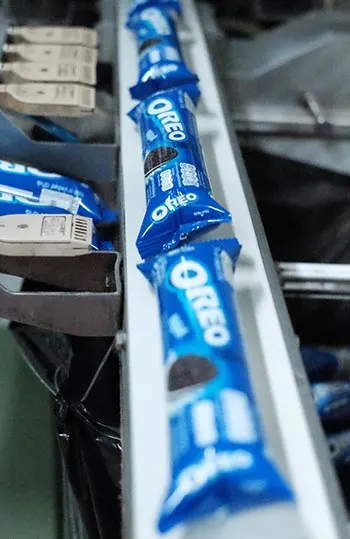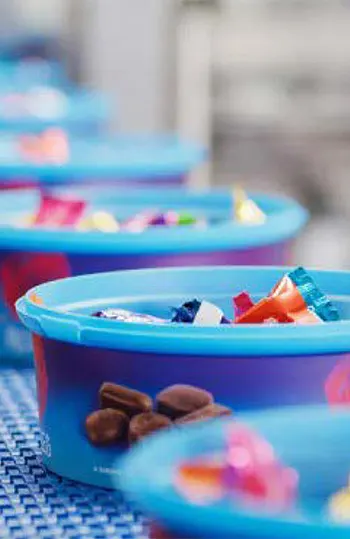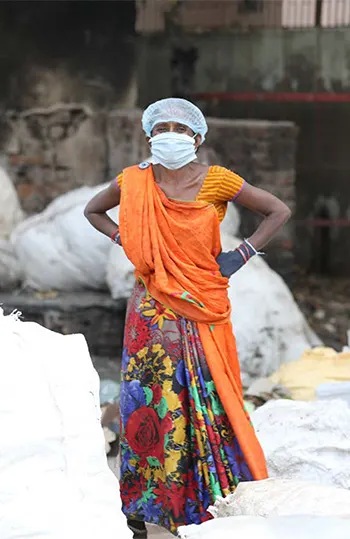- /
More Sustainable Packaging
We work hard to use packaging that does more than protect our products and delight our consumers. At Mondelēz International, we strive to continually improve our packaging with the long-term aim of advancing our support for a more circular economy for packaging.
Making It Light and Right
We believe that by continuously improving our packaging and measuring our performance, we can work towards our long-term aim of advancing our support for a more circular economy for packaging. For us, this is based around a three-part approach that helps us utilize packaging that is both light and right. The three parts are:
Reducing Packaging by aiming to utilize packaging that is light, safe and, when appropriate, can be reused or recycled.
Evolving Packaging involves evolving our packaging so that it’s designed to be recyclable, and utilizes recycled plastic content, where appropriate, to help drive down packaging waste. Our key goal is to use packaging that is designed to be recyclable and continue our use of recycled content.
Improving Systems means supporting the development of infrastructure and capabilities with a goal of being able to collect as much plastic as we put into the environment. As part of this, we are supporters of policy development and Extended Producer Responsibility (EPR) schemes to cover the development of systems supporting collection of all types of plastic packaging, and are involved in ongoing collaboration with governments, peers and others.
Learn more about each of these three parts below.

Reducing Packaging
We remain on track to achieve our 2025 goal of 5% reduction vs 2020 levels in our use of virgin plastic and are set to see progress in the year ahead in line with expectations. Thanks to the slowly increasing availability of new materials, such as recycled content for flexible film in key markets, as well as supply chain adjustments and successful line trials across a complex network of manufacturing facilities we continue to make progress. In 2023 we were able to reduce our plastic packaging footprint by about (2.3)% versus 2020, offsetting the significant growth that our business has been able to deliver. In our rigid plastic portfolio we have been working with suppliers to secure new innovative materials and planning trials that will enable us to drive scale as we expand these initiatives across markets while continuing to maintain our high standards for safety and quality.
Mondelēz International is one of the founding business signatories to the Ellen MacArthur Foundation (EMF)’s Global Commitment, which unites organizations behind a common vision of a circular economy for plastics. Of the 123 businesses that contributed data for the EMF’s 2023 Global Commitment Progress Report, we were delighted to be singled out as the brand that reported the highest tonnage elimination of plastic packaging: over 12,000 metric tonnes. This was achieved by moving about 71% of our polystyrene (a versatile material that can be rigid or formed) to polyethylene, terepeththalate (a clear, durable and versatile material), eliminating all undetectable black plastic from our portfolio with a specific focus in North America and resizing products resulting in reductions in metric tonnes of plastic packaging used.

Evolving Packaging
We continue to make meaningful strides in the evolution of our packaging material. As of the end 2023 approximately 96% of our packaging was designed to be recyclable with many markets now close to achieving our ambition and we continued to achieve this performance while experiencing strong growth of non converted materials across our portfolio.
We continue working across our markets to recognize local requirements, educating suppliers on Mondelēz International and industry standards, and collaborating with our peers amongst other actions. To account for various strategic and operational factors including but not limited to our mergers and acquisitions strategy and growth, as well as external factors like evolving regulatory requirements, we are updating our goal to: We aim to have approximately 98% or more of our packaging designed to be recyclable by 2025.
We continue to collaborate within the industry and across sectors to ensure that the actions we take can have the scaled impact we need to see. In 2023, we became members of the Ocean Plastics Leadership Network (OPLN), a global multi-stakeholder community dedicated to ending plastic pollution in our oceans. With OPLN we are working with our peers along the value chain to produce responsible production guidelines for advanced recycling.
Further, with the CGF we continue to support advancement of the Golden Design Rules, and as co-chairs of the CGF Plastic Waste Coalition of Action’s Flexibles Working Group we work with our peers to help advance circularity for flexibles, such as EPR for flexibles.

Improving Systems
Systems and infrastructure are critical for packaging materials to be recycled in practice. As such, along with local market engagement in policy design and informal and formal development, we continue to play an active role in the UN Global Treaty for Plastic Pollution via the Business Coalition. We are active members of its policy working group, which aims to harmonize regulation on reduction, circulation and prevention. The group is also part of the EMF and World Wildlife Fund’s (WWF) joint working group on policy development. In 2024 – a decisive year – the group aims to align on a treaty seeking to end plastic pollution by 2040.
In the Philippines, meanwhile, we partnered with PCX with a goal for the recovery and diversion of all of the equivalent of our in- market yearly plastic packaging output. PCX partners with organizations that collect and divert post-consumer waste in a credible, traceable, transparent and socially-responsible manner. In 2023 we expanded our investment in Circulate Capital beyond Southeast Asia and India to the newly established Latin America Fund. The fund aims to enhance focus on the physical collection of flexible films – lightweight, multi-layer plastics used by the snacking industry – that have traditionally been more difficult to collect, sort, recycle and ultimately reuse.
Our Progress
OUR AIM* | 2023 PERFORMANCE |
|---|---|
Approximately 98% or more of our packaging designed to be recyclable by 2025 | 96% |
5% reduction in virgin plastic by 2025 (vs. 2020) | (2.3)% |
25% reduction in rigid virgin plastic by 2025 (vs. 2020) | 9% |
5% recycled plastic content by 2025 | 1.4% |
*We aim to regularly and transparently report our progress. You can find additional details on Mondelēz International's ESG goals and reported information within the About This Report section of our 2023 Snacking Made Right ESG Report.